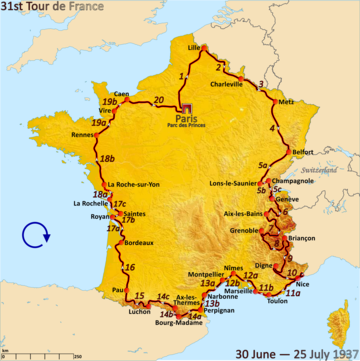 Route of the 1937 Tour de France followed clockwise, starting in Paris | |||||||||||||||||||||||||
| Race details | |||||||||||||||||||||||||
|---|---|---|---|---|---|---|---|---|---|---|---|---|---|---|---|---|---|---|---|---|---|---|---|---|---|
| Dates | 30 June – 25 July 1937 | ||||||||||||||||||||||||
| Stages | 20, including eight split stages | ||||||||||||||||||||||||
| Distance | 4,415 km (2,743 mi) | ||||||||||||||||||||||||
| Winning time | 138h 58' 31" | ||||||||||||||||||||||||
| Results | |||||||||||||||||||||||||
| |||||||||||||||||||||||||
The 1937 Tour de France was the 31st edition of the Tour de France, taking place from 30 June to 25 July. It consisted of 20 stages with a total length of 4,415 km (2,743 mi).
Charles Holland and Bill Burl became the first British cyclists to ride the Tour. Burl lasted only two stages, but Holland rode well until he was eliminated on stage 14c after mechanical problems.[1] The British Empire was also represented by the only non-European in the Tour: Canadian Pierre Gachon, who never completed the first stage. The complete Belgian team (including 1936 and 1939 winner Sylvère Maes) withdraw from the race because of "French chauvinism". Complaints from the Belgian team included of French spectators throwing stones at the Belgian team, closing train crossings, and throwing pepper in the eyes, and being punished unreasonable strictly (adding extra time in the standing) while French riders were hardly punished at all while being helped.
The race was won by French cyclist Roger Lapébie.
Cite error: There are <ref group=lower-alpha> tags or {{efn}} templates on this page, but the references will not show without a {{reflist|group=lower-alpha}} template or {{notelist}} template (see the help page).